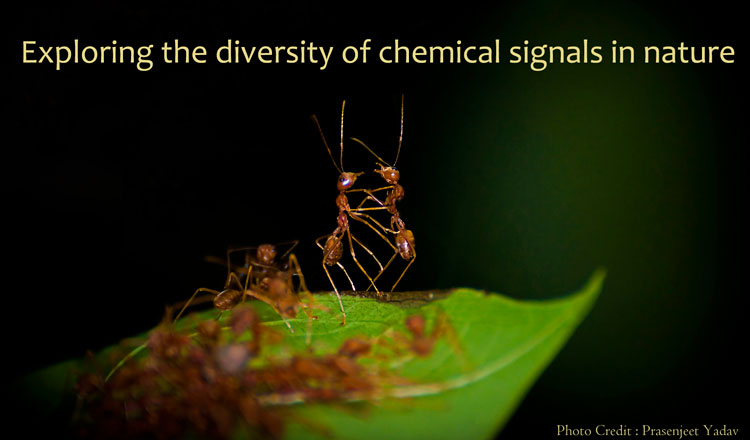Exploring the diversity of chemical signals in nature
The Chemical Ecology program at NCBS has received a major fillip in the form of support from the Department of Biotechnology (DBT). The recently awarded grant will boost multi-disciplinary and multi-institutional chemical ecology research networks among researchers at Bangalore and North eastern Region (NER) and will result in the creation of a fresh cadre of chemical ecologists in the country. "Given the extraordinary diversity in our country, in terms of biological flora and fauna as well as in terrestrial and marine ecosystems, there is an amazing opportunity for research in understanding the mysteries of myriad interactions that sustain these ecosystems. This timely grant will allow us to build up research capacity at NCBS and our collaborating institutions, in conjunction with researchers in the North East to uncover the main language utilized for these interactions, namely chemical communication. We also envisage the establishment of long-term monitoring sites for ecological studies in the bio diverse region of the North East" says Prof Satyajit Mayor, the Director of NCBS.
Chemical ecology is, simply, the language of nature. All organisms, from bacteria to plants to humans use chemical cues to communicate between themselves and their environment. The environment around us is filled with such interactions. Imagine if you could unravel the nature and mechanism of these interactions. This is the field of Chemical ecology, which draws on biochemistry, genetics, neuroscience and behavior, all in the context of natural biological systems. Understanding this chemical cross-talk, mediated by hormones, pheromones and epidermal secretions can result in important biological outcomes when applied in environmental and agricultural contexts.
The Chemical Ecology program at NCBS found its origins in the strong ecological research base at NCBS, followed by recent recruitment of chemical ecologists who have set up independent laboratories. Dr Shannon Olsson, who trained at the Max Planck Institute, aims to understand the chemical basis of insect decision-making. Another recent faculty appointee, Dr Radhika Venkatesan is interested in understanding the basis of interactions between plants, insects and microbes. The journey has already begun for the team of researchers. "We are already actively collaborating as a prelude to the NER grant with Dr. Y Rajashekar of IBSD Imphal on understanding and developing natural and ecologically-friendly pesticides and insect repellents from native Indian plants" says Dr Olsson.
The recently funded program was the brain-child of the late Prof KS Krishnan, an unusual biologist with a flair for asking unique questions. His sustained interest in this area has also resulted in chemical ecology workshops and teaching programs bringing together varied approaches to the myriad questions surrounding the chemical basis of interactions in nature "It has been great to see the growth of their teaching initiatives, such as the highly successful annual short course, named after KS Krishnan, to bring international experts together with researchers and students in India." says Prof Upinder Bhalla, the Dean at NCBS.
The Northeastern region provides an amazing canvas of biodiversity to investigate such chemical interactions in nature. Biodiverse regions must harbour amazing interactions between species, and states like Nagaland, Meghalaya, Arunachal Pradesh, Sikkim and Manipur have a wealth of unstudied systems to offer to chemical ecology research. This will motivate researchers from these states and from institutes in Bangalore (IISc, NCBS and GKVK) to explore and understand unknown chemical languages present in nature. The program also knits various disciplines together including chemistry, biochemistry, molecular biology, neurobiology and ethology and draws a cluster of researchers having complementary skills to investigate different organismal interactions mediated by natural chemicals.
The most unique aspect of this program is its objective. Unlike with other research agendas, this program does not aim to answer specific research questions, but instead aims to build scientific capacity in the northeast and collaborative capacity in the country. Collaborative teams of scientists will work together in natural and experimental laboratories. This will result in the training of PhD students, Postdoctoral researchers and technicians from northeastern India. The scientific capacity that will emerge from this collaboration will create novel research directions at the national level, and help build a cohesive community of researchers. This initiative would also generate facilities for field research in the remote northeastern states, infrastructural support and well-equipped laboratories in the NER, helping solidify research potential of the region and benefit all. "What could be better than exciting science in unexplored places, the process of which builds a scientific community? I am excited to embark on this journey of discovery together with our northeastern colleagues" says Dr Uma Ramakrishnan, faculty at NCBS and overall coordinator of the multi-institutional project.
"India, and in particular our North-East is home to extraordinary hotspots of biodiversity. Scientific and technological advances allow the deciphering of the chemistry of specific interactions, for example between plants and insects that make such ecosystems. Teasing apart such interactions is scientific detective work of the highest order. The twinning of Bangalore with the North-East will be transformative for both new science and new and sustainable biotechnology in this area" says Prof K. VijayRaghavan, DBT Secretary.

Comments
Post new comment